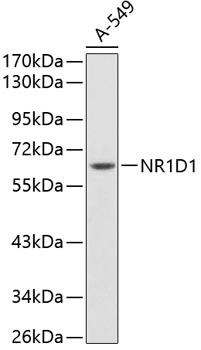Anti-NR1D1 Antibody (CAB1478)
- SKU:
- CAB1478
- Product type:
- Antibody
- Reactivity:
- Human
- Reactivity:
- Mouse
- Host Species:
- Rabbit
- Isotype:
- IgG
- Antibody Type:
- Polyclonal Antibody
- Research Area:
- Cell Biology
Description
| 抗体名: | Anti-NR1D1 Antibody |
| 抗体コード: | CAB1478 |
| 抗体サイズ: | 100µL |
| 申し込み: | WB IP |
| 反応性: | Human, Mouse |
| 宿主種: | Rabbit |
| 免疫原: | Recombinant protein of human NR1D1 |
| 申し込み: | WB IP |
| 推奨希釈: | WB 1:500 - 1:2000 IP 1:20 - 1:50 |
| 反応性: | Human, Mouse |
| ポジティブサンプル: | A-549 |
| 免疫原: | Recombinant protein of human NR1D1 |
| 精製方法: | Affinity purification |
| ストレージバッファ: | Store at -20'C. Avoid freeze / thaw cycles. Buffer: PBS with 0.02% sodium azide, 50% glycerol, pH7.3. |
| アイソタイプ: | IgG |
| 順序: | Email for sequence |
| 遺伝子ID: | 9572 |
| Uniprot: | P20393 |
| セルラーロケーション: | Cell projection, Cytoplasm, Nucleus, dendrite, dendritic spine |
| 計算された分子量: | 66kDa |
| 観察された分子量: | 67kDa |
| 同義語: | NR1D1, EAR1, THRA1, THRAL, ear-1, Rev-erbAlpha |
| バックグラウンド: | This gene encodes a transcription factor that is a member of the nuclear receptor subfamily 1. The encoded protein is a ligand-sensitive transcription factor that negatively regulates the expression of core clock proteins. In particular this protein represses the circadian clock transcription factor aryl hydrocarbon receptor nuclear translocator-like protein 1 (ARNTL). This protein may also be involved in regulating genes that function in metabolic, inflammatory and cardiovascular processes. |
| UniProt Protein Function: | NR1D1: a widely expressed member of the orphan nuclear receptor family of proteins. Expressed at relatively high levels in adipose tissue, skeletal muscle, brain and liver, and regulates cellular proliferation and differentiation. Expression increases during differentiation in adipocytes and its ectopic expression in 3T3-L1 cells potentiates adipocyte differentiation. A metabolic regulator whose expression is increased in HER2-positive breast cancer cells. Regulates malate dehydrogenase 1 (MDH1) and malic enzyme 1 (ME1), enzymes that link glycolysis and fatty acid synthesis. May contribute to the abnormal cellular energy metabolism observed in HER2-positive breast cancers. Its expression oscillates with circadian rhythm in liver cells, regulating the expression of BMAL1, ApoA1 and ApoC3, all key regulators of circadian rhythm. Represses the basal activity of the mouse Bmal1 gene promoter. Phosphorylation by GSK3b at S55/59 stabilizes NRD1 protein levels. Regulates inflammation by targeting the NF-??B responsive genes IL-6 and COX-2. NR1D1 lacks the activation function 2 domain required for ligand-dependent activation of transcription by other members of the nuclear receptor family; thus it behaves as a constitutive repressor protein, recruiting the nuclear receptor co-repressor N-CoR1/HDAC3 complex to target genes to repress transcription. |
| UniProt Protein Details: | Protein type:Nuclear receptor; Transcription factor Chromosomal Location of Human Ortholog: 17q11.2 Cellular Component: nucleoplasm; nuclear chromatin; dendrite; cytoplasm; dendritic spine; nucleus Molecular Function:ligand-dependent nuclear receptor activity; protein binding; zinc ion binding; heme binding; steroid hormone receptor activity; transcription corepressor activity Biological Process: proteasomal protein catabolic process; circadian rhythm; circadian thermoregulation; transcription initiation from RNA polymerase II promoter; glycogen biosynthetic process; intracellular receptor-mediated signaling pathway; regulation of lipid metabolic process; regulation of fat cell differentiation; positive regulation of transcription, DNA-dependent; negative regulation of transcription from RNA polymerase II promoter; regulation of circadian rhythm; negative regulation of toll-like receptor 4 signaling pathway; gene expression; steroid hormone mediated signaling; circadian regulation of gene expression; negative regulation of transcription, DNA-dependent; cell differentiation |
| NCBI Summary: | This gene encodes a transcription factor that is a member of the nuclear receptor subfamily 1. The encoded protein is a ligand-sensitive transcription factor that negatively regulates the expression of core clock proteins. In particular this protein represses the circadian clock transcription factor aryl hydrocarbon receptor nuclear translocator-like protein 1 (ARNTL). This protein may also be involved in regulating genes that function in metabolic, inflammatory and cardiovascular processes. [provided by RefSeq, Jan 2013] |
| UniProt Code: | P20393 |
| NCBI GenInfo Identifier: | 119100 |
| NCBI Gene ID: | 9572 |
| NCBI Accession: | P20393.1 |
| UniProt Secondary Accession: | P20393,Q3UV55, |
| UniProt Related Accession: | P20393 |
| Molecular Weight: | 67kDa |
| NCBI Full Name: | Nuclear receptor subfamily 1 group D member 1 |
| NCBI Synonym Full Names: | nuclear receptor subfamily 1 group D member 1 |
| NCBI Official Symbol: | NR1D1 |
| NCBI Official Synonym Symbols: | EAR1; hRev; THRA1; THRAL; ear-1; REVERBA; REVERBalpha |
| NCBI Protein Information: | nuclear receptor subfamily 1 group D member 1 |
| UniProt Protein Name: | Nuclear receptor subfamily 1 group D member 1 |
| UniProt Synonym Protein Names: | Rev-erbA-alpha; V-erbA-related protein 1; EAR-1 |
| Protein Family: | Nuclear receptor subfamily |
| UniProt Gene Name: | NR1D1 |
| UniProt Entry Name: | NR1D1_HUMAN |


